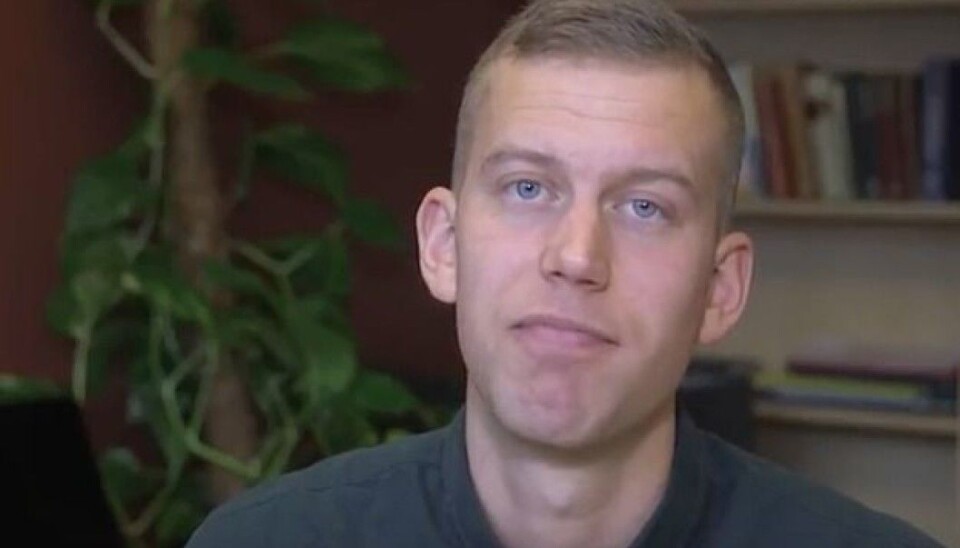
Scientist made free self-help courses for ten common mental disorders
Social anxiety, fear of blushing, performance anxiety, panic anxiety, fear of flying, diverse phobias, health anxiety, insomnia and depression. A psychologist at the University of Oslo and has observed a huge need for beneficial, free assistance. So he supplied it himself.
How about self-help courses for the ten most common mental problems we meet in the course of our lives?
Most people encountering these challenges never seek out traditional face-to-face treatment with a professional.
When a researcher at the University of Oslo realised that there were no adequate self-help courses – based on recognised research and available online and free for everyone – he spent a year and a half rectifying the situation.
The ten psychological problems Magnus Nordmo can help you with were not chosen at random. They collectively represent the majority of mental disorders in Norway.
They are offered both in Norwegian and English.
Many can be helped
“I saw there was a big need out there. There are so many who don’t get help for what we often call lighter mental problems,” says Magnus Nordmo to ScienceNordic’s Norwegian partner, forskning.no.
Yet the researcher at the University of Oslo knew that many can get assistance through research-based self-help courses.
Such courses do not help everyone, but they do help many.
Magnus Nordmo has tested the courses on volunteers who had mental disorders. He has seen quite a few users find them to be quite an eye-opener with regard to their problems. It’s like a lightbulb switches on: “Aha!”
But there is no abracadabra; it’s not an easy fix. The psychologist stresses that persons who wish to change their lives really need to be committed to the task.
They have to set aside time for his programmes.
If you are plagued by a problem such as social anxiety you will have to dare to challenge your anxiety, even though this can be tough.
Nordmo’s job is as a research fellow at the University of Oslo’s Department of Psychology and he researches the effect of various psychological methods used on patients with mental disorders. He earlier published a scientific article on the effect of self-help programmes for social anxiety.
Cognitive therapy
Cognitive therapy or cognitive behavioural therapy is the form that Nordmo uses in the ten courses. It is a type of treatment that doesn’t beat around the bush. It homes directly in on the problems you have.
“An important point in cognitive therapy is what you do yourself about your difficulties,” explains Nordmo.
“How you react personally to the symptoms you experience is also essential. This is how it is, whether you have anxiety problems, sleep problems or depression.”
“Your own thoughts and your own reactions have a huge impact on whether your problems are sustained or reinforced and made worse.”
Magnus Nordmo has no doubts that psychological torments can disappear or at least be reduced and kept to a level a person can live with if he or she manages to make the right choices. His self-help courses can give you the tools you need to get there.
Lighter psychological problems
Magnus Nordmo has set out to reach the many that have what is ordinarily called lighter psychological disorders.
Such disorders are common enough in the population to be called a widespread disease. Far fewer suffer the really heavy mental disorders. The patients who can use the self-help courses often do not qualify for psychological help through the public health services, even though their problems can be very troublesome.
So this means many do not get help. They can often be totally isolated with their problems and might keep them secret. Others who are not eligible for free or cheap help through a national health scheme pay for private sessions with psychologists or other counsellors.
Population studies have concluded that about half of all Norwegians will suffer mental health problems some time in their lives. Nordmo asserts that the numbers would be even higher if we include lesser or short-term difficulties many encounter – for instance after a divorce or death of a spouse.
“Another example is fear of flying. This is a very common problem for which very few seek help,” says Nordmo.
Facing your anxieties
The treatment for aviophobia, the fear of flying, is actually quite simple. The same goes for arachnophobia, the fear of spiders.
“It is basically a matter of facing your fears, either by boarding an aircraft or holding a spider in your hand. If you encounter your anxiety in the right way you will find it disappearing after a while.”
The problem you will have with your phobia is that the right way to meet your anxiety could seem counterintuitive and unnatural. Most people want to shield themselves from their anxieties by shying away from the problem. But this reinforces it.
“At the same time, we need to be cautious about saying this is easy for everyone,” stresses Nordmo. “Many individuals find it terribly hard to face their anxiety. But most who give it a try say afterwards that the only thing they regret is not doing it sooner.”
Many can be cured
Nordmo thinks many people have good chances of curing their mental problems.
Others will find that their problems do not go away but at least will be easier to deal with. This is because they know more about their afflictions after engaging in cognitive therapy. They might get an extra impetus for seeking more help or talking to someone about their problems.
Some will also experience that a problem like depression returns, for instance if they become seriously ill or wind up in a life crisis. But with Magne Nordmo’s toolbox at hand, they might be better equipped the next time they get depressed.
Cognitive therapy for depression
Depression is the mental affliction that has received the most research to date which shows that many can benefit from cognitive therapy.
“There is no miracle cure for treatment of depression. But it is well documented that therapeutic sessions, discussing with a psychologist, have a good effect, compared to equivalent patients who do not see a psychologist.”
“Moreover, a number of studies have found that results can be as good as with a psychologist if one completes a counselled self-help course. You can do that with a psychologist, with your regular MD or another person who advises you through a programme like the one I have made. Ditto for anxiety and sleeping problems,” says Nordmo.
Do self-help courses work?
The question of whether self-help courses like Nordmo’s can be as beneficial as personal counselling and follow-ups is a matter of debate among researchers. But international guidelines recommend self-help therapy for those who are not offered face-to-face therapeutic help or unable to receive this or other alternatives.
Magnus Nordmo cannot say the courses he has made will help you with your mental problems. That has not been sufficiently documented by research.
“But we have researched enough to assert this is something that clearly should be offered to the many out there who have no access to anything else,” says Nordmo.
Self-help jungle
With access to Google and YouTube there is no shortage of advice to be found for anyone struggling with psychological issues. Bookstores are also stocked with literature in this genre.
Part of the reason why Magnus Nordmo created his self-help courses was to put something out there which is free of cost and which circumvented all the weird stuff he saw being offered to people with psychological challenges.
“Gurus of every hue, many without any knowledge of psychological research, are offering help. Many demand payments. You find similar literature in the bookstores. The psychological do-it-yourself market in books and courses is extensive.”
“However, little of this is based on well-documented research. Much is just something the author cooked up at home,” says Nordmo.
He as seen that when people with mental difficulties enter the self-help jungle they can encounter a landscape that is impossible to navigate through.
First free course
Magnus Nordmo is not the first to make a research-based self-help course for psychological problems. But he might well be the first to offer it totally free of charge.
Other similar courses and programmes are often linked to treatment regimens from health institutions, specialists or other counsellors.
The foundation ExtraStiftelsen gave Psychologist Magnus Nordmo of the University of Oslo the equipment and the opportunity to spend time to make a free course that anyone with internet access can use.
Sources and references:
Magnus Nordmo, Aksel Inge Sinding, Per Carlbring, Gerhard Andersson, Odd E. Havik and Tine Nordgreen: “Internet-delivered cognitive behavioural therapy with and without an initial face-to-face psychoeducation session for social anxiety disorder: a pilot randomized controlled trial”, the journal Internet Interventions, 2015.
JV Olthuis et al.: “Therapist-supported Internet cognitive behavioural therapy for anxiety disorders in adults (Review)”,Cochrane Library, 2015
Eirini Karyotaki et al.: “Efficacy of Self-guided Internet-Based Cognitive Behavioral Therapy in the Treatment of Depressive Symptoms A Meta-analysis of Individual Participant Data”, JAMA Psychiatry, 2017
Norsk Helseinformatikk: “Psykiske lidelser: Hjelper flere med å hjelpe seg selv”, article, 2018.
Norwegian Institute of Public Health: “Psykiske lidelser hos voksne”, e, 2014.
——————————————————-
Read the Norwegian version of this article at forskning.no.
Translated by: Glenn Ostling































